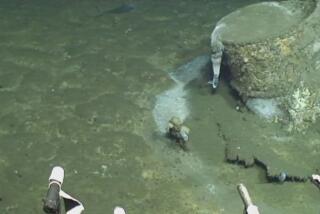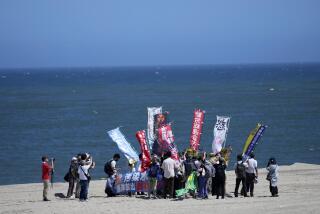U.S. to Seek Ban on Ocean Dumping of Nuclear Waste : Environment: The issue will be raised at London talks. Russia was caught dumping low-level waste in Sea of Japan.
- Share via
WASHINGTON — In a reversal of U.S. policy, the Clinton Administration said Wednesday that the United States will call for an international ban on all ocean dumping of low-level nuclear waste.
Saying that the nuclear powers “have a special responsibility to display leadership on sensitive ocean environmental issues,” the White House announced that it will formally propose the moratorium during a meeting next week of the London Convention, a legal entity that operates under the International Maritime Organization.
The White House decision came three weeks after environmental activists associated with Greenpeace International exposed a Russian warship dumping liquid nuclear waste into the Sea of Japan. The revelation prompted Japan, which had opposed a formal ban on such dumping, to call for an international accord halting all such activity.
France and Britain oppose a legal ban.
In making its decision, the Clinton Administration overruled the U.S. Navy, which traditionally has sought to keep open an option for low-level nuclear disposal at sea. Under current international law, low-level radioactive waste may be disposed of in the ocean if a country receives a special permit. Such waste is generated by commercial nuclear reactors, hospitals and weapons plants.
While Washington until now has opposed a legal ban on low-level nuclear waste dumping at sea, the United States has not dumped such materials in the ocean since 1970.
The dumping of high-level nuclear waste in the oceans has been illegal since the 1950s. But Clifton Curtis, a U.S.-based political adviser to Greenpeace International, said that Russia frequently has dumped both high-level and low-level nuclear waste over the past decade. Switzerland, Britain and Belgium disposed of low-level nuclear waste at sea until 1983, when the 71 parties to the London Convention agreed to a voluntary moratorium.
Greenpeace called the Clinton Administration’s decision “a major victory for global environmental protection” and praised the U.S. government for “regaining the mantle of leadership within the London Convention.”
The Clinton Administration called the new position “a prudent measure” and said it will request continuation of scientific studies measuring the environmental impact of such dumping.
A total of 172 nations expressed general support for a ban on nuclear waste dumping at sea at the Earth Summit in Rio de Janeiro last year. But until recently, five countries in addition to the United States--Britain, Canada, France, Japan and Russia--have opposed such a ban.
A report drafted for the London Convention over the last decade concluded that the dumping of low-level nuclear wastes raises concerns about the diffusion of radioactivity. The report also warned that low-level waste, once dumped, could be difficult to retrieve. That report is expected to be presented to the 71 parties to the London Convention.
The London Convention sets international standards for ocean dumping of radioactive and industrial waste as well as sewage and sludge. At the coming meeting, its members also will debate a proposal to end the practice, since 1991, of incinerating hazardous waste at sea.
More to Read
Sign up for Essential California
The most important California stories and recommendations in your inbox every morning.
You may occasionally receive promotional content from the Los Angeles Times.











